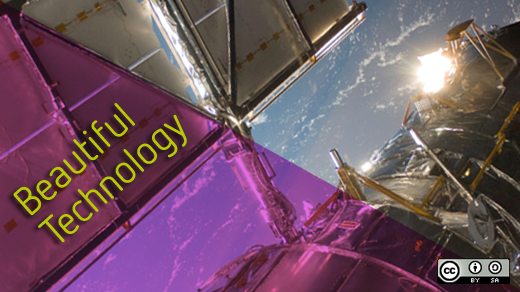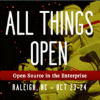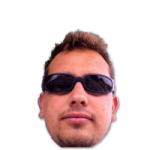It's not every day you get to interview your father. And mine works for a completely different company on very different projects, but in this interview I got a chance to talk to him about a topic of common ground between us: open source—a pretty unique concept that binds an ever-growing community together.
Pat Huff has been working in the software industry since its infancy and started his career as a "rocket engineer" working on launch systems for various companies in Cape Canaveral, Florida. He got me started working with computers and programming at a young age, however, we went in a totally different directions when I left Big Blue for a small "Linux" company based out of Raleigh, North Carolina. Ironically our career paths have converged, and we are both working on open source software projects.
Pat was introduced to open source while working with OTI (Object Technology International), a SmallTalk and Java solutions company acquired by IBM, which was the early beginnings of the Eclipse project. He continued to work with open source and embraced the concepts of agile development while managing an embedded Java development team working on object oriented tooling.
Currently, Pat is a Program Director for Rational at IBM where he maintains the relationship between the IBM product development community and the Eclipse Foundation. Pat also sits on the Eclipse Board of Directors representing IBM. In addition to his board duties, he is the chair of the Eclipse IP Advisory Committee and the co-chair of the Eclipse Long term Support Working Group.
Despite knowing a lot about him, this interview was a chance for me to ask him some things I never had before. And, as you can imagine, I didn't have a hard time tracking him down. We also discussed his upcoming presentation at the All Things Open conference.

Can you tell us a bit about yourself and your background?
I have been involved in some form of software development my entire career. In the beginning it was microcode and assembly language, but it soon evolved to higher level languages. The end product has changed, from space launch systems to airline reservation systems, to embedded Java solutions, to developer tool suites, but the common thread has always been the software development processes and disciplines required to deliver these solutions. My role now gives me the unique opportunity to work closely with a vibrant open source community while pursuing commercial adoption of those projects.
Tell us how you went from "rocket engineer" and got into open source.
I have been fortunate to work on many projects during my career. My first jobs were with Lockheed and then Martin where I was on their launch teams. Then I started with IBM working on the launch team for the space shuttle. At IBM I was lucky to have a varied range of interesting assignments and when IBM acquired Object Technology International (OTI) I was fortunate to be able to work closely with this team. OTI brought to IBM the core components that would eventually be donated to jump start the Eclipse Foundation. Participating in this process introduced me to the open source movement and I have been a huge fan ever since.
What areas or verticals do you see open source succeeding in in the commercial space?
Well one obvious one to me is the one I am involved in, which is software development tools and infrastructure. I also see a lot of excitement around the machine-to-machine solutions area and especially the Internet of Things. There are some very interesting projects at Eclipse that are addressing this space.
What's been the most challenging part of being with the Eclipse Board of Directors? And what's been the most rewarding moment?
The biggest challenge is to balance my fiduciary responsibilities to the Eclipse Foundation as a board member with the business needs of my company. As a Board Member, I am responsible to help guide Eclipse and basically to oversee the policies and strategic direction of the Eclipse Foundation. At the same time, I am representing the interests of my company to the extent that they do not conflict with the Foundations needs.
The most rewarding moment: participating in a dynamic and relevant organization. The Eclipse staff is very knowledgeable and a pleasure to work with.
Can you give us a sneak preview as to what you will cover in your All Things Open talk (without giving too much away)?
It is not easy to adopt open source software into a commercial product; there are many potential pitfalls. I have lived and breathed this process for many years. I want to help folks who may see a role for open source in their companies but are not sure how to do it. But it is not just about consuming open source, participation in the community is just as important and in my opinion, vital to both your success and the community's success.
Read more from the All Things Open speaker interview series.







Comments are closed.